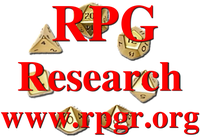Determine Optimal Duration of Role-playing Gaming Sessions
Test with single session adventures, or just a few sessions, and then also with longer term campaigns.
If an adventure reaches beginning and end during one session, how much educational and/or therapeutic benefit is realized from one short session, if any. As with all candidates, they will be tested for a baseline prior to beginning a game session, and then a brief questionnaire at the end of the session. In the case of testing for just single sessions, have them return a week later to complete the usual questionnaire from a week after the session, but not have them engage in another session, instead have them take some tests to see if any changes are noticeable from their original baseline. If any changes noted, then have them return after one month, and then six months.
Have another group run through a short multi-session module, experimenting between 3-8 weekly sessions. After sessions are completed, have them return 1 week, then 1 month after the sessions. If any changes noted, and still indicated at one month later, then have them return six months, and 1 year later, to determine if differences are sustained from baseline.
Finally, try testing with longer campaigns spanning around 8 weeks to 6 months, or even a year. Then follow up with testing as above, but if changes noted, attempt to keep testing annually for up to 10 years, or 20 years if at all possible (accounting for the issues of attrition).
Of course all of these will be run with parallel control groups.
Document Actions

